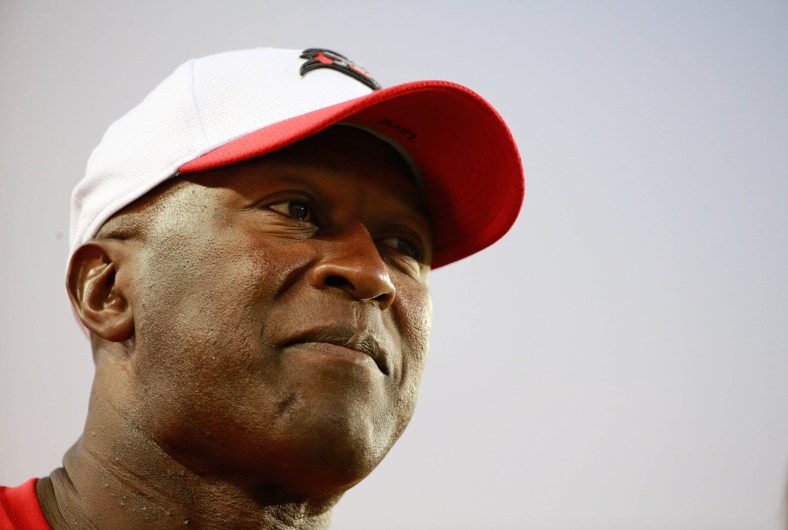
The Tampa Bay Buccaneers finished this past regular season with a surprising 6-10 record. They were in the NFC playoff picture into December and tripled their win total from the previous season.
With 2015 No. 1 overall pick Jameis Winston playing good football and the Buccaneers showing themselves to be competitive on a consistent basis, there was no talk of any real shake ups within the organization.
For the first time in a while things seemed to be going swimmingly with continuity taking hold.
Then:
The Buccaneers have dismissed Head Coach Lovie Smith.
READ: https://t.co/gCXSNjCzCv pic.twitter.com/JYiUragENy
— Tampa Bay Buccaneers (@Buccaneers) January 7, 2016
News that shocked an unsuspecting NFL world was also met with boatloads of criticism from Buccaneers players themselves (via SI.com).
That’s the first sign that a firing wasn’t too popular internally — initial reaction from the players.
When reports came trickling in Wednesday evening about how the decision to fire Smith went down, one specific piece of information caught this scribe by surprise:
#Bucs coach to me right now: “Is this true? We all just met with Lovie individually today. This is strange. I wonder what happened?"
— JosinaAnderson (@JosinaAnderson) January 7, 2016
It’s a bush league way of doing business. How in the world can the Buccaneers organization legitimately defend itself here? After all, it fired a popular coach in the darkness of the night with his assistants not knowing fully what had happened.
For an assistant coach to seriously have to ask a reporter if the information regarding the firing of his boss was true is absolutely stunning.
Information then trickled in early Thursday indicating that Smith was fired over the phone.
While the initial reaction there is to continue throwing criticism the Buccaneers’ way, it’s important to note that there was a specific reason for this.
In a conversation with general manager Jason Licht Wednesday night, Smith himself realized something was adrift. He then spoke with the higher ups, at which point the head coach was fired.
“Lovie gracefully declined the meeting – very polite, in a way only Lovie could do it,” Licht said, via USA Today Sports. “And he said he would rather do it this way.”
That’s not the issue anyone should have with Smith’s firing. Internal dynamics of a decision like this won’t ever be fully known to the public. Instead, it’s nothing more than speculation and assumption.
What we do know is that Smith led a previously downtrodden Buccaneers organization back to respectability this past regular season.
As a defensive-minded head coach, some will point to the fact that this side of the ball wasn’t too great in Tampa. After all, its defense did finish 26th in the NFL in points against and only forced three turnovers in the team’s final six games.
The best indicator of success on defense isn’t how many points it gives up. There are just too many variables that go into play here, mainly how the offense performed and how many short fields the defense was given to work with.
Tampa Bay finished 10th overall in total defense, including a run defense that yielded an average of 3.4 yards per attempt.
The issue here is that Tampa Bay’s offense ranked in the top-10 in the NFL in turnovers, which isn’t all-too uncommon for a team that’s relying on a rookie starting quarterback.
With a shorter field behind it, the Buccaneers’ defense was simply put behind the proverbial eight-ball too many times. Hence, the discrepancy in the team’s defensive rankings.
The general rule of thumb around the NFL is that you give a head coach three years to turn around the product on the field.
Though, there are a wide array of circumstances that can play a role here. If a team hasn’t improved from the time a coach took over to the time that the decision has been made to move on, there’s legitimate reason to actually move on.
As it relates to Smith, he took over a four-win team and guided it to two wins in his first season. On the surface, that might have been reason enough to move on from him after the 2014 campaign.
The one variable in play here was huge. Following the disastrous draft selections and free agent moves of the previous regime, Tampa Bay completely cleaned house of multiple veteran players — leaving Smith in a situation to have to start from scratch.
That obviously played a role in Tampa Bay’s decision to retain him following a two-win 2014 season.
So why fire him after he led the Buccaneers to three times the amount of wins than the previous year?
This is the question that no one has an answer to. Well, no one outside of the Buccaneers organization itself.
Licht had the following to say after Smith’s ousting (NBC Sports):
“When you have eight wins, and three home wins, in two years, you have been patient enough.”
Was Smith somehow being judged on how the team performed during what many believed was a transitional 2014 season? If so, isn’t that the short-sighted mentality that had Tampa Bay in the doldrums prior to a surprising 2015 campaign?
The NFL is a win-now business. This much is understood by those who take on coaching jobs. If you don’t find some resemblance of success early on, you are not necessarily going to last too long.
But patience must be a virtue. Things don’t tend to turnaround overnight. Instead, it’s a process from the top down. In this, the process within the Buccaneers organization failed miserably.
Check out Vincent’s other work on eDraft.com and follow him on Twitter. His work can also be seen on MSN, Fox Sports and Forbes.